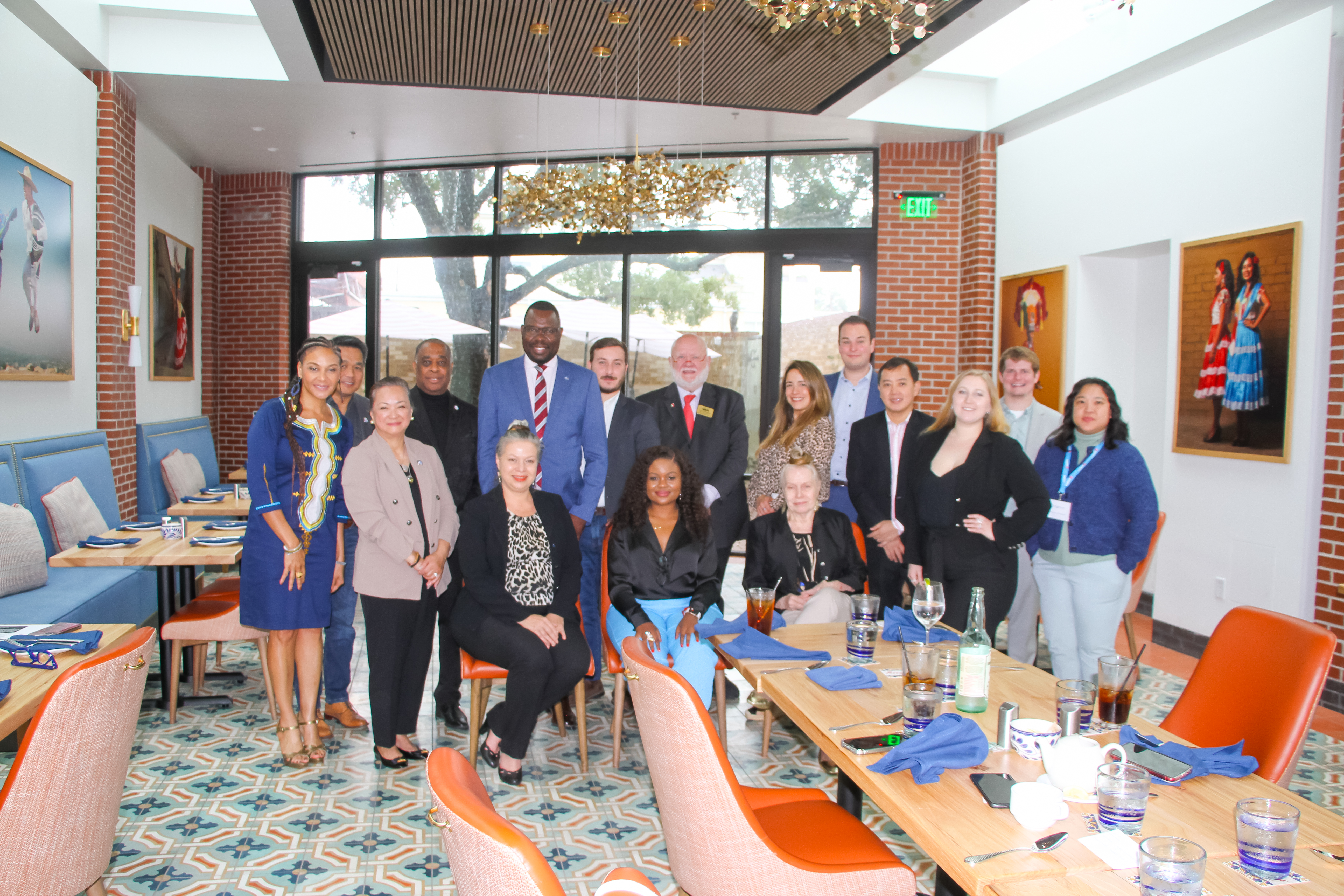Study Tour
Study Tour: Free Trade, How to Win Friends and Alliances in the Geoeconomic Age

The World Order and Globalization Hub welcomed its twentieth delegation of experts in November for an eight-day study tour focusing on free trade. The Hub hosted a delegation of eight participants representing Malaysia, Philippines, Zimbabwe, Chile, Turkey, South Africa, Italy, and Germany for the program. The delegates included Members of Parliament, Academics, Think Tank Leaders, Reporters, and Senior NGO Advisors. The tour took place in Washington, DC and Houston, Texas. During the week, the delegation held meetings with experts and practitioners in the field of international trade.
The meeting partners in Washington, DC included the United States Trade Representative (USTR), a Baker Institute Fellow, and experts from the Center for Strategic and International Studies (CSIS), the Council on Foreign Relations (CFR), American University, the CATO Institute, the Senate Finance Committee, and Washington International Trade Association (WITA).
On Sunday, the delegation met over lunch with FNF North America Regional Director Claus Gramckow and incoming Regional Director Martin Biesel. During the discussion, Mr. Gramckow and Mr. Biesel discussed current developments of American politics, the relationships between the states and the federal government, and the outlook for the 2024 U.S. presidential elections. They also took the time to answer questions from the participants, including ones about the 2024 presidential election predictions and U.S. foreign policy more broadly.
The discussion in Washington, DC opened with the current state of international trade in the participants’ home countries and regions. Participants presented on their current government’s outlook on free trade and trade agreements at play across regions. A common theme noted was the general trend toward friendshoring and protectionism. The only exception to this trend was the outlook from Chile, which relies heavily on the ability to trade. Most people touched on the need for stronger self-sufficiency, as gaps and weaknesses in the supply chain were exposed in the pandemic, which seems to be the impetus for the recent uptick in friendshoring and nearshoring policies.
This protectionist sentiment became a common theme across the meetings in DC. Multiple agencies and think tanks touched on the Biden Administration’s stagnation and refusal to reverse policies and geopolitical moves made under the Trump Administration. Many experts in DC shared concern for the growing protectionist trend; however, the current domestic political landscape still makes free trade a tough sell. There was also a shared frustration across institutions at the Biden Administration’s lack of action to reverse the previous administration’s actions.
Notable agreements and pieces of legislation frequently mentioned were the Comprehensive and Progressive Agreement for Trans-Pacific Partnership (CPTPP), the Indo-Pacific Economic Framework (IPEF) and the African Growth and Opportunity Act (AGOA). All of these international agreements had the intention of strengthening and legitimizing multilateral partnerships, but for one geopolitical reason or another, each has failed to live up to their intended goal. The trend of non-binding agreements failing to reach their full potential further illustrates the fractured international trade landscape.
The second half of the program took place in Houston, Texas, a city chosen for its grasp on trade, exports, and multitude of successful industries. Houston is the largest port in the country in terms of international tonnage, making it incredibly relevant to the theme of international trade. The meeting partners in Houston, Texas included Rice University, the Greater Houston Partnership, Amegy Bank, Wallenstein Law Group, and a panel of experts associated with the Houston International Trade Development Council.
Factors that have influenced the current international trade landscape include interruptions and pitfalls in the supply chain elucidated by the pandemic; as well as restrictive tariffs and policies introduced under the Trump Administration that the Biden Administration has yet to restructure. The Houston outlook on business reflected a strong inclination to uphold international trade partnerships, despite the considerable number of on-going global crises and rising political tensions. Numerous Houston experts stressed the importance of diversifying industries, which can both increase profits and add an element of protection for the local economy. In order to diversify successful industries in a city or region, there must be ample opportunity to do business, henceforth the impetus for international free trade.
Across the board, from partners in both DC and in Houston, there is very little consensus for a global, regional, or even national plan for moving forward in the area of international trade. Every country and state is still reeling from the effects of the pandemic, amongst other present points of turmoil. There is however consensus across institutions that it is impossible for every country to completely self-isolate and be 100% self-sufficient. No one country possesses the necessary raw materials, energy infrastructure, energy resources, space for pollutants, and agricultural capabilities, to completely disconnect from global trade. Regardless of the current shift towards protectionism, the need for international collaboration is still widely accepted.
During the group’s final evaluation session the participants discussed the general themes and takeaways from the week’s meetings. Participants found the variety of perspectives from think tanks, to Federal Government insight, to the Houston regional perspective, to be a valuable mix of expertise. The difference in regional outlooks on international trade made for more interesting and deeper discussions on the true nature of the current state of the international trade landscape.
The participants expressed sincere gratitude for the opportunity to take part in this study tour. Many participants emphasized the value of the personal relationships they had made with their fellow participants, as well as the value of the conversations they had with the numerous experts during the week. The contrast between the meeting partners in Washington and Houston was also a highlight for the participants. Several participants noted how directly relevant some of the speakers were to their specific work, and their personal inclination to collaborate with some of them in the future. The World Order and Globalization Hub would like to thank all of the participants for their engagement and insightful contributions throughout the program.
